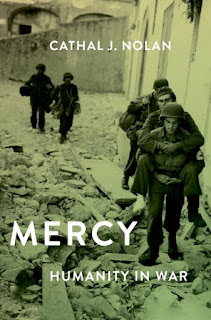 and the first Distinguished Book Award from War on the Rocks. Nolan's other works include a two-volume Concise History of World War II; Wars of the Age of Louis XIV; a two-volume study of The Age of the Wars of Religion; a study of Principled Diplomacy, and several edited books in ethics in international affairs and international and military history. He is Professor of History at Boston University, a Progress Fellow at the Mercatus Center at George Mason University, and a Fellow of the Quincy Institute for Responsible Statecraft.
and the first Distinguished Book Award from War on the Rocks. Nolan's other works include a two-volume Concise History of World War II; Wars of the Age of Louis XIV; a two-volume study of The Age of the Wars of Religion; a study of Principled Diplomacy, and several edited books in ethics in international affairs and international and military history. He is Professor of History at Boston University, a Progress Fellow at the Mercatus Center at George Mason University, and a Fellow of the Quincy Institute for Responsible Statecraft.
Nolan applied the "Page 99 Test" to his new book, Mercy: Humanity in War, and reported the following:
The Page 99 Test won't work for this book because it is a half paragraph that closes a chapter called “Grace.” Here is what precedes it on page 98. Right after the disaster in the Hürtgenwald, during the Battle of the Bulge in the Ardennes, one forest over, a terrified 19-year-old American GI called Norbert Gubbels is trapped with an unfamiliar platoon inside a collaborator’s castle in Luxembourg. It’s blanketed in snow and surrounded by Germans, some dead but many more alive. Looking out, he sees an arm in feldgrau weakly waiving a few hundred yards away, amidst a pile of corpses. He volunteers, along with three others, to go out with a blanket-stretcher and bring in a mortally wounded enemy who was trying to kill them all a day earlier. The Germans on the low hills don’t shoot until the rescue party is back inside, then the baffling logic of war resumes. The wounded man can’t speak. He starts to die faster as his wounds thaw and blood flows more freely from a missing foot and two large holes in his back. Some Americans want to kill him and throw his body out a high window. Norbert and several others say “no.” They nurse the German through a night of agony, providing a morsel of comfort as he weaves in and out of consciousness and the precious morphine they jab him with. He dies a day later. Fearing a tank attack, the platoon makes a run for American lines but their half-track hits a mine. Norbert is badly concussed, separated and alone, listening to Germans in the woods. He climbs into the back of a passing truck with a white star stencil, full of kitchen gear. He watches Patton’s men burn a German sniper alive and passes out. Diagnoses: “battle fatigue.” Relieved of combat duties, he’s sent to the south of France to guard POWs, whom he slips extra bits of potato. To the end of his life in 2014 Norbert Gubbels has ever worse nightmares about the bloody, silent woods of December 1944. He never forgets the mortally wounded German for whom he risked his life. Asked why he did it, he asks back in quiet humility: “What would you have done?”Learn more about Mercy: Humanity in War at the Oxford University Press website.
The Page 99 Test: The Allure of Battle.
--Marshal Zeringue



